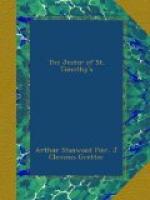But there were no more violent encounters, such as had taken place in the class-room; Westby never quite crossed the line again; and Irving controlled his temper on threatening occasions. These occurred in dormitory less often; the fine weather and the fall sports—football and tennis and track athletics—kept the boys out-doors. On rainy afternoons there was apt to be some noise and disorder—usually there was what was termed an “Allison hunt,” which took various forms, but which, whether resulting in the dismemberment of the boy’s room or the pursuit and battery of him with pillows along the corridors, invariably required Irving’s interference to quell it. This task of interference, though it was one that he came to perform more and more capably, never grew less distasteful or less humiliating; he saw always the row of faces wearing what he construed as an impudent grin. What seemed to him curious was the fact that Allison after a fashion enjoyed—at least did not resent—the outrages of which he was the subject; after them he would be found sitting amicably with his tormentors, drinking their chocolate and eating their crackers and jam. This was so different from his own attitude after he had been teased that Irving could not understand it. After studying the case, he concluded that the “Allison hunts” were not prompted by any hatred of the subject, but by the fact merely that he was big, clumsy, good-natured, slow-witted—easy to make game of—and especially by the fact that when aroused he showed a certain joyous rage in his own defense. But Irving saw no way of learning a lesson from Allison.
As the days went on, the sense of his isolation in the School became more oppressive. He had thought that if only the fellows would let him alone, he would be contented; he found that was not so. They let him alone now entirely; he envied those masters who were popular—whom boys liked to visit on Sunday evenings, who were consulted about contributions to the Mirror, the school paper, who were invited to meetings of the Stylus, the literary society, who coached the football elevens or went into the Gymnasium and did “stunts” with the boys on the flying rings.
One day when he was walking down to the athletic field with Mr. Barclay, he said something that hinted his wistful and unhappy state of mind. Barclay had suspected it and had been waiting for such an opportunity.
“Why don’t you make some interest for yourself which would put you on a footing with the boys—outside of the class-room and the dormitory?” he asked.
“I wish I could. But how?”
“You ought to be able to work up an interest of some sort,” said Barclay vaguely.
“I don’t know anything about athletics; I’m not musical, I don’t seem to be able to be entertaining and talk to the boys. I guess I’m just a grind. I shall never be of much use as a teacher; it’s bad enough to feel that you’re not up to your job. It’s worse when it makes you feel that you’re even less up to the job that you hoped to prepare for.”




